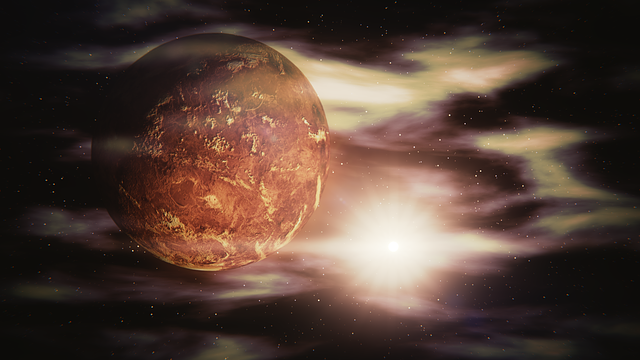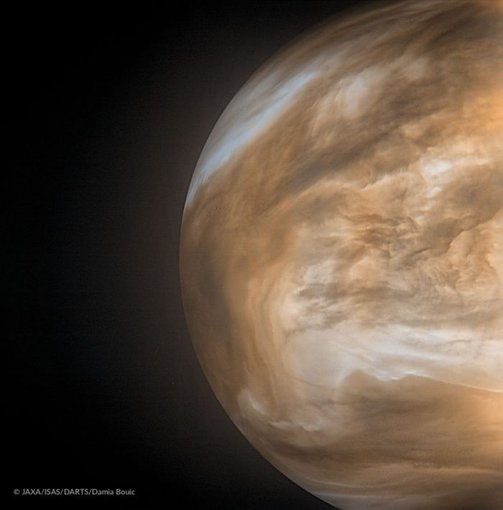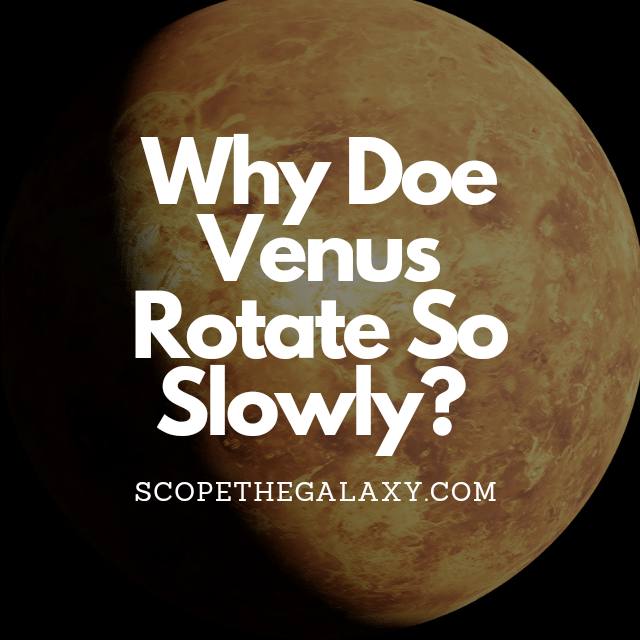*This post may contain affiliate links. This means we may make a commission if you purchase an item using one of our links*
One day on Venus is equal to around 243 Earth days! That’s longer than its year, which is only 225 Earth days. This slow rotation has baffled scientists for decades, though there are some theories as to what may be the cause of this phenomenon. One is the planet’s extremely dense atmosphere; the other is its proximity to the sun.
Continue reading to discover how the dense atmosphere and the sun’s gravitational pull affect the rotational period and orbit of Venus. Find out if we can speed up the planet’s rotation and why it appears to spin backward.
Why Does Venus Have The Slowest Rotation?
Table of Contents
Maybe you’ve heard the fun fact “a day on Venus is longer than a year,” but the science behind the reality is quite startling.
The planet Venus has a prolonged rotation, with one single revolution taking the equivalent of 243 Earth days. But, its atmosphere moves considerably faster, completing a full rotation in just four days.
Venus’ atmosphere is around 100 times as dense as Earth’s atmosphere and composed mainly of CO2, making it particularly good at trapping heat.
It’s hard for us to understand the complete makeup of Venus as a planet’s core is challenging to study at the best of times. But on Venus, where temperatures reach 475C, it’s almost impossible.
Venus’s rotation is the slowest in our galaxy by a long way. The next slowest planet’s rotation period is Mercury at 58.6 Earth days, while Mars sits at 1.03 Earth days.
Can We Speed Venus’ Rotation Up?

Venus actually seems to be rotating at an increasingly slower rate. New research showed that the planet’s spin rate is 6.5 minutes slower than it was 16 years ago.
This could be due to the friction from Venus’ thick atmosphere or an angular momentum exchange with planet Earth.
Time is rather complicated on Venus, thanks to its extremely dense atmosphere. This thick air flows much faster than the speed at which the planet spins. As it pushes against the mountainous surface of Venus, it can change the rate at which the planet rotates.
Using a computer simulation, scientists are able to see how the high winds exert enough pressure to push one side of the mountains and provide suction on the other side to alter the speed of rotation.
The atmosphere of Venus increases the speed of rotation by up to around two minutes each day. Considering that the average day on Venus is approximately 350,000 minutes, we can conclude that this doesn’t significantly impact Venus’ spin rate.
So there must be another force causing Venus to slow down, which could be the gravitational influence from the sun.
With our current understanding of Venus, there is no way for us to speed up the rotation. Even if we were to alter the atmosphere, it would have minimal impact on the overall rotation speed of the planet.
Does Venus Spin Backwards?
Not only does Venus spin slowly, but it also does so in retrograde – meaning that it spins the opposite way to the other planets. One possible reason why this is the case is that Venus may have flipped its 180-degree axis at some point.
This would mean that Venus’ rotation only appears to be retrograde because it is upside down. This could have been caused by the sun’s gravitational pull on the highly-dense atmosphere of the planet, causing strong tides. These tides, combined with the friction between the mantle and core of Venus, could be responsible for what flipped the planet in the first place.
This means that the sun rises in the west and sets in the east on Venus – the opposite of what we experience on Earth.
Another theory is that Venus could have been impacted by another planet billions of years ago.
How Does The Slow Rotation Affect Venus?

If you could spend a day on Venus, it would be quite a discombobulating experience. First of all, you’d have to find a way to overcome the 475C heat, and then you’d experience a day that was 243 Earth days in length. The process of sunrise to sunset would take around 117 Earth days, and the sun would rise in the west.
In addition, Venus only has a three-degree tilt, so its seasons produce no noticeable change in temperature or climate.
Venus’s proximity to the sun affects its rotation and could also explain why the planet has no moons. Mercury and Venus do not possess enough gravity to let a satellite stray too far before it would slip from its orbit.
Thanks to the enormous gravitational force of the sun, any moon would likely be captured from Venus by this huge solar body.
The surface of Venus is covered with volcanoes, rifts, mountains, and vast plateaus. But scientists estimate that the surface of Venus is only 150 million years old, which is young from a geological perspective, and has scientists questioning what happened to make the planet complete a total resurface.
The thick atmosphere is one of the defining features of Venus, which makes it the hottest planet in our solar system – even though Mercury is closer to the sun. The greenhouse effect of the CO2 in the atmosphere causes the planet to be around 390C hotter than it would be without the thick atmosphere.
But Venus’ super thick atmosphere composed of the greenhouse gas CO2 would be largely unaffected regardless of the planet’s speed of rotation.
And the clouds which impact Venus’ rotation (albeit moderately) are thick toxic masses of sulphuric acid that smell like rotten eggs.
Summary
There’s no denying that Venus has a slow rotation. Still, its retrograde spin could be a matter of our perception following Venus’s collision with another planet or a 180-degree pole shift. Either way, Venus certainly poses more questions to scientists than it answers.
Until we find a way to explore beyond the surface of this red hot planet, we won’t know the true composition of Venus or its potential effect on the rotational speed and orbit
References
Why Does Venus Spin So Weirdly? | Space
planetary science – Why is the rotation rate of Venus so slow? – Space Exploration Stack Exchange
Scientists baffled to discover that Venus’ spin is slowing down — Science & Technology — Sott.net
orbit – What would change if Venus rotated at a speed and direction similar to Earth? – Astronomy Stack Exchange

